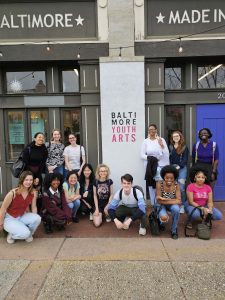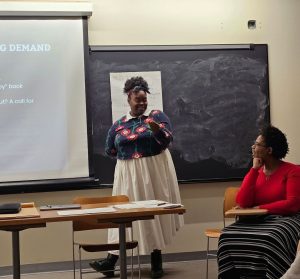[Guest post by Katharine Noel, Associate Teaching Professor, Writing Seminars, Johns Hopkins University]
As a grad student, I was given three days of teacher training before being thrown into a classroom. This was a composition class with fifty first-year students. My pedagogical training – if you can call it that – included how to grade on a curve and how to confront cheating and plagiarism without using the words “cheating” or “plagiarism,” a dodge that would supposedly protect the university from lawsuits. The focus on school protocols implied that teaching itself would be straightforward. After all, as grad students, we were working at advanced levels; shouldn’t imparting a simplified version of our subject be easy?
Without any real idea of how to convey my “expertise,” I thought back to my own professors. I wanted, of course, to emulate the best of them, teachers who’d connected with their students, creating excitement while at the same time expressing warmth and engagement. And yet I’d learned just as many lessons – possibly more – from the ineffective teaching I’d observed: the professor who was charismatic and funny but seemed more concerned with making the students adore him than helping them engage with the subject. Or the one who started discussions with questions so long and complicated – filled with backtracking, amendments, and counterarguments – that by the time she was finished, students had no idea what they were meant to discuss. Teachers who seemed dismissive or defensive. Teachers too rigid to pivot; teachers too lax to have an overarching plan.

The Teaching Fellows and WBS mentors on a teaching field trip to Baltimore Youth Arts, a creative entrepreneurship and job training program focusing on young people involved in the justice system
Recently, I’ve been reminded of this early teaching experience. At Hopkins, I teach in The Writing Seminars department. In addition to standard creative writing courses, for the last five years I’ve taught a community-based learning class in partnership with the nonprofit organization Writers in Baltimore Schools (WBS), founded by Hopkins alum Patrice Hutton. Thanks to a grant from CTEI, this past year we expanded the class to become the year-long Teaching Fellows Project.
The Teaching Fellows – twelve undergraduates chosen by application from across KSAS – lead weekly creative writing groups in under-resourced elementary and middle schools across the city. The class they take with me provides training and support, as well as the opportunity to work closely with WBS mentors. We study topics like student-centered pedagogy, educational equity, and the social and political context in which Baltimore schools operate. Writers in Baltimore Schools provides curriculum for teaching elementary and middle-school writing groups, but near the end of the year, each Hopkins student creates, teaches, and revises an original lesson plan based on the interests and needs of their students.

A guest lecture by Ms. Araba Maze, founder of Storybook Maze, which aims to increase book access in Baltimore’s book deserts
The CUE-2 final report stresses the importance of community-based and applied learning, stating that “we should aspire to transform the college experience from one composed solely of traditional elements – lectures, papers, problem sets, and exams – to one in which these elements sit amid a much broader range of learning activities.” The Teaching Fellows Project is designed to provide this kind of community-based and applied learning opportunity, connecting academic theory to real-world impact. Students bring what they learn in our classroom to their worksites, and bring what they learn in their worksites back to our classroom. Knowledge gained from meaningful engagement in the community is deepened by the knowledge gained through reading, discussions, and guest lecturers, and vice-versa. At times, it all feels very meta: as I teach students to teach, I also point out the techniques and tactics I’m using as a teacher; as students encounter challenges at their worksites, I adjust my curriculum to address those topics that feel most relevant and vital.
One of the first exercises the Teaching Fellows do, based on my own early groping for models, is to think back to their best teachers and try to isolate what made them so effective. Some of these “teachers” are the ones they had in classrooms; others turn out to be coaches, bosses, ministers, co-workers, or relatives. The next week, we repeat the same exercise by discussing frustrating learning experiences. The complicated interwoven skills of teaching can be most visible when they work together imperfectly, since excellent teachers achieve a kind of magic that means – as with any magician – their moves can be too deft to make out.
My scant training as a grad student seemed predicated on the idea that teaching could and should be easy. What the WBS mentors and I try to convey in The Teaching Fellows Project is very different: that teaching is often hard, confounding, overwhelming, and awkward – as well as thrilling, meaningful, revealing, and joyous. It can even – at rare moments – feel nearly effortless.
Katharine Noel
Associate Teaching Professor, Writing Seminars
Johns Hopkins University
Prior to coming to Johns Hopkins, Katharine Noel was the Writer in Residence at Claremont McKenna College (2009 to 2013). From 2002-2009, she was a Jones Lecturer at Stanford University, where she held Wallace Stegner and Truman Capote fellowships in 2000–2002. Before teaching at Stanford, she worked for two years at Gould Farm, a program in the Berkshire Mountains for adults with mental illnesses, and for four years at an Oakland, California shelter for women and children experiencing homelessness. At Hopkins, in addition to teaching fiction writing, she directs The Teaching Fellows Project.
Image Source: Writers in Baltimore Schools
